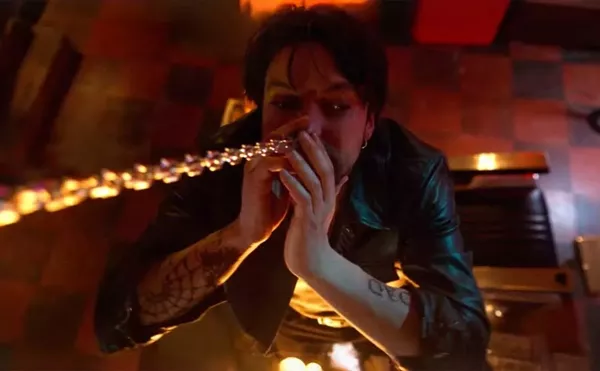
Audio By Carbonatix
[
{
"name": "GPT - Leaderboard - Inline - Content",
"component": "35519556",
"insertPoint": "5th",
"startingPoint": "3",
"requiredCountToDisplay": "3",
"maxInsertions": 100,
"adList": [
{
"adPreset": "LeaderboardInline"
}
]
}
]
Like a satire with an angry tone insufficiently modulated by humor, French writer-director Gaspar Noé’s Irreversible is such a raw and determined outrage that, for its first third at least, it seems pushy and self-indulgent. Not that it isn’t an effectively repulsive piece of work.
Its now infamous set piece, a nearly 10-minute rape scene filmed by a fixed camera without edits, is designed to make you squirm on several levels: for the female character in the story, for the two actors involved in the scene and at your own passivity in sitting through it without walking out. And yet, after a few minutes, it begins to seem weirdly rhetorical, like a demonstration piece, an ostentatiously simulated illustration of how to be transgressive. Toward its end, Noé, perhaps sensing that his big sequence lacks a certain juice, digitally inserts (as it were) a brief glimpse of the rapist’s bobbing detumescence.
Irreversible’s narrative moves backward, regressing from the symbolic hell of a satanic gay nightclub called The Rectum (and to accuse Noé of gay-bashing is just to pick out a strand of his general misanthropy) to the literal heaven of a strobing white light above a park on an idyllic summer’s day. During the beginning-end, the lighting is dark and intermittent; the camera jumps around like a hyperactive flea and a huskily sinister bass throbs away beneath the action. What we’re witnessing, though we don’t know it until later, is Marcus (Vincent Cassel) revenging the rape and possible murder of his girlfriend Alex (Monica Bellucci) by the odious pimp known as the Tapeworm (Jo Prestia). The film then moves upward and back to a colon-like tunnel where the evil deed takes place, then further back and more into the light, to Marcus and Alex’s pre-catastrophe life.
It’s during this final section that one’s endurance of the film’s more grueling sequences pays off, as the couple’s ostensibly banal loveplay takes on a heightened and tender resonance for those of us who have seen the future. The film may be philosophically trite and gratuitously over the top, but it also offers a startlingly original method of generating serious empathy for unexceptional characters.
One could never accuse Noé of being even remotely sentimental, and yet this is one of the saddest movies I’ve seen in a long time.
Opens Friday exclusively at the Main Art Theatre (118 N. Main, Royal Oak). Call 248-542-0180.
Richard C. Walls writes about film for Metro Times. E-mail letters@metrotimes.com.





